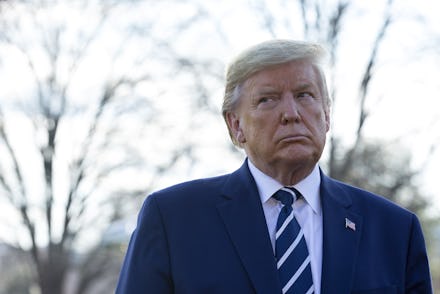Trump keeps insisting coronavirus "will go away" as the number of U.S. cases increases

It's no secret that President Trump's response to the ongoing outbreak of the COVID-19 coronavirus strain has been, shall we say, a complete mess — one which continued apace Friday, as the president insisted that his border security measures were helping contain infection rates, while he simultaneously demonstrated apparent ignorance of virus's actual death toll so far.
"It will go away," Trump told reporters during a signing ceremony for more than $8 billion in funding to combat the virus's spread. "We have very low numbers [of confirmed cases] compared to many countries throughout the world, our numbers are lower than almost anyone ... deaths, is it 11?"
In fact, at the time of this writing, the U.S. death toll is 14 people, not 11, out of roughly 250 confirmed cases across the country. Indeed, this would put the national death rate at around 5.6%, which is much higher than the estimated global rate of 3.4%, although some experts caution that that rate may drop as testing and treatment for the disease increases.
"In terms of cases it’s very, very few," Trump went on. "When you look at other countries, it’s a very tiny fraction because we’ve been very strong at the borders."
It's not the first time Trump has insisted that his fantasy of a coronavirus-less country is the result of his equally dubious claim of strong borders.
While Trump has, in fact, somewhat tightened travel restrictions in a few specific cases — expanding the already onerous limits on travel to Iran, and issuing "warnings" for travel to other infected regions — he ultimately backed down from his earlier threat to close the U.S.-Mexico border entirely (which increasingly seems to be his default solution to any sort of problem). And as health experts have pointed out, closing the U.S. borders would likely have minimal effect on the virus's spread at this point, anyway.
"I hope President Trump is not thinking about shutting down the borders completely, because then you really do have a situation in which we can’t help other nations and the disease will nonetheless be here," Ohio State University College of Public Health Dean Amy Fairchild told The Intercept. "We will only end up creating vulnerable, underserved populations in this country, and we'll exacerbate the challenges of providing aid to African and Asian countries that have more fragile health care systems."
In other words: At this point in the virus' spread, closing the borders would be more like locking us in, rather than keeping illness out.
All this comes as the White House ricochets back and forth on its messaging about the ongoing outbreak. While Vice President Mike Pence, who has been put in charge of the administration's response to the virus, has admitted that the U.S. lacks the necessary testing supplies to actually track the disease, the president himself is making public proclamations intended to make it seem as if this incredibly serious situation is both under control (it's not) and not that dangerous to begin with (it is).
Meanwhile, Trump can't even get his own messaging straight when it comes to the coronavirus. After the White House insisted for much of Thursday that president would travel to the Centers for Disease Control headquarters Friday, they ultimately dropped the trip from his public schedule, claiming that Trump's visit would disrupt the work going on there. Except when Trump himself spoke to the press Friday morning, he claimed he might not go because he'd heard rumors a CDC staffer had been infected with the disease.
Finally, as of Friday afternoon, the president's trip to the CDC was back on, with White House Press Secretary Stephanie Grisham telling the press that "what the president said is true. Thankfully she's negative, the person." Not exactly the sort of steady, unwavering leadership you want to see in a viral crisis.